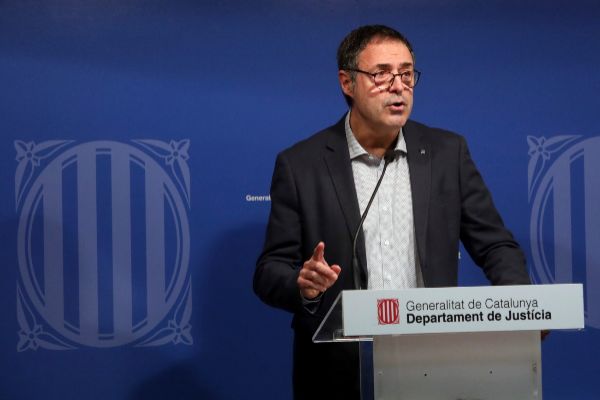- Catalonia.The prisoners of the 'procés' will remain in jail although they maintain the means to obtain permits
- Newspaper library: The Generalitat may release 1-O prisoners even if the Supreme Court sets limits
- Newspaper library.The Generalitat allows Oriol Pujol to leave each day in prison to go to work
Since last Wednesday the treatment boards of the Catalan prisons of Lledoners , Puig de les Basses and Mas d'Enric proposed the second penitentiary degree for the nine imprisoned independence leaders, convicted of sedition by the Supreme Court, have not stopped appearing Change them on the date they can leave to enjoy the first permits, as well as convert their detention into a political throwing weapon between Junts Per Catalunya, with the support of some relatives, and ERC, responsible for the Department of Justice on which the prison services depend .
Waiting for this counseling to decide - surely in mid-January, so it will not run out of two months - on the penitentiary degree that corresponds to the nine independent prisoners, JxCat presses for the third degree to be granted, for what they would only go to sleep in prison.
However, sources from the Prosecutor's Office consider that this classification is not acceptable due to the high prison sentences imposed, so they would present an appeal that after the decision of the Penitentiary Surveillance Court would end up before the Supreme Court as a sentencing court. In this way, inmates are exposed to a rapid revocation of a hypothetical third grade.
On the other hand, a classification in the second degree, as the treatment boards have proposed taking into account that they are between nine and 13 years in prison, opens the door to claim for the inmates article 100.2 of the penitentiary regulation, which Flex the second and third grades.
That is to say, they are still locked up, but they can leave a few hours according to their rehabilitation treatment plan designed by each prison individually to work, perform some type of volunteering in a charity or social entity, or take care of a sick family member for a few hours. .
Prosecutors meeting in Barcelona
But what the Prosecutor's Office wants to avoid is that this application of article 100.2 becomes "a third undercover degree". So they will be attentive to the rehabilitation plans of each inmate and see their application form. In this sense, you must take into account the daily hours that allow them to leave as well, as the number of days per week to do so. So it does not seem so clear that it can be from Monday to Friday.
The last word on the application of this article of the penitentiary regulation has the Penitentiary Surveillance Court and the appeals are presented before the Provincial Court of Barcelona .
To discuss the possible scenarios that will be opened from the decision of the Secretariat of Criminal Measures, Reintegration and Attention to the Victims of the Generalitat on the nine independentistas detained, the superior prosecutor of Catalonia, Francisco Bañeres , and the lieutenant fiscal, Pedro Ariche , met last Friday with the penitentiary surveillance prosecutors and the chief prosecutor of Barcelona, Concepción Talón .
During this meeting, there was talk of coordinating a response to the classification, of the rejection of a third degree and of verifying the prisons' approach to the application of a hypothetical 100.2 with a second degree on a case-by-case basis, seeing if it conforms to the parameters of the regulations and is done properly taking into account the evolution and circumstances of each inmate.
Although the Public Prosecutor's Office will follow the guidelines of the State Attorney General's Office, everything indicates that they will resort to a third degree, but always observing each one of the resolutions of the prison administration. On a 100.2, sources of the Prosecutor's Office are clear that it is a more flexible regime, since it allows exits to do activities within their individual treatment program, but that it will be necessary to see how to carry it out in each inmate.
The Secretary of Criminal Measures, Amand Calderó , recalled last week that they will not run out of two months to classify sovereignist prisoners and that the treatment programs of the Catalan and Spanish prison system do not respond to the needs of the independence prisoners, and that have a different profile than the rest of the prison population.
In addition, he added that the treatment boards should assess the aspects to work with each inmate, since "all are disabled" and could not return to their political career. Thus, they should look for another professional outlet.
According to the criteria of The Trust Project
Know more- Supreme Court
- Junts per Catalunya
- ERC
- Catalonia
- Proced judgment
- Catalonia independence
'Procés'The Constitutional confronts the debate on the resources of Oriol Junqueras divided
Justice The Generalitat rejects the judge of the Constitutional Court Andrés Ollero for "lack of impartiality"
'Procés''Sed de Lex', the 52 days of Arcadi Espada in the Supreme Court

